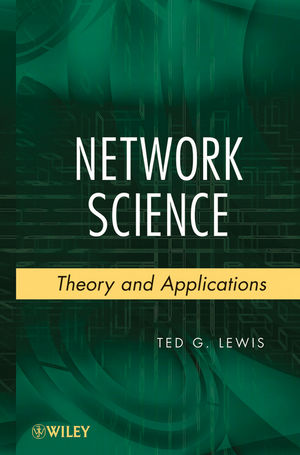Network Science: Theory and ApplicationsISBN: 978-0-470-33188-0
Hardcover
524 pages
March 2009
 This is a Print-on-Demand title. It will be printed specifically to fill your order. Please allow an additional 10-15 days delivery time. The book is not returnable.
|
||||||
1 Origins 1
1.1 What Is Network Science?, 5
1.2 A Brief History of Network Science, 8
1.3 General Principles, 19
2 Graphs 23
2.1 Set-Theoretic Definition of a Graph, 25
2.2 Matrix Algebra Definition of a Graph, 33
2.3 The Bridges of Ko¨nigsberg Graph, 38
2.4 Spectral Properties of Graphs, 42
2.5 Types of Graphs, 46
2.6 Topological Structure, 54
2.7 Graphs in Software, 63
2.8 Exercises, 68
3 Regular Networks 71
3.1 Diameter, Centrality, and Average Path Length, 74
3.2 Binary Tree Network, 79
3.3 Toroidal Network, 85
3.4 Hypercube Networks, 89
3.5 Exercises, 95
4 Random Networks 97
4.1 Generation of Random Networks, 100
4.2 Degree Distribution of Random Networks, 106
4.3 Entropy of Random Networks, 110
4.4 Properties of Random Networks, 118
4.5 Weak Ties in Random Networks, 125
4.6 Randomization of Regular Networks, 127
4.7 Analysis, 128
4.8 Exercises, 129
5 Small-World Networks 131
5.1 Generating a Small-World Network, 135
5.2 Properties of Small-World Networks, 142
5.3 Phase Transition, 156
5.4 Navigating Small Worlds, 160
5.5 Weak Ties in Small-World Networks, 169
5.6 Analysis, 171
5.7 Exercises, 173
6 Scale-Free Networks 177
6.1 Generating a Scale-Free Network, 180
6.2 Properties of Scale-Free Networks, 190
6.3 Navigation in Scale-Free Networks, 203
6.4 Analysis, 207
6.5 Exercises, 214
7 Emergence 217
7.1 What is Network Emergence?, 219
7.2 Emergence in the Sciences, 223
7.3 Genetic Evolution, 225
7.4 Designer Networks, 233
7.5 Permutation Network Emergence, 243
7.6 An Application of Emergence, 252
7.7 Exercises, 258
8 Epidemics 261
8.1 Epidemic Models, 264
8.2 Persistent Epidemics in Networks, 275
8.3 Network Epidemic Simulation Software, 287
8.4 Countermeasures, 289
8.5 Exercises, 297
9 Synchrony 299
9.1 To Sync or Not to Sync, 300
9.2 A Cricket Social Network, 307
9.3 Kirchhoff Networks, 324
9.4 Pointville Electric Power Grid, 331
9.5 Exercises, 335
10 Influence Networks 337
10.1 Anatomy of Buzz, 340
10.2 Power in Social Networks, 347
10.3 Conflict in I-Nets, 357
10.4 Command Hierarchies, 360
10.5 Emergent Power in I-Nets, 362
10.6 Exercises, 371
11 Vulnerability 375
11.1 Network Risk, 378
11.2 Critical Node Analysis, 382
11.3 Game Theory Considerations, 407
11.4 The General Attacker–Defender Network Risk Problem, 408
11.5 Critical Link Analysis, 410
11.6 Stability Resilience in Kirchhoff Networks, 428
11.7 Exercises, 430
12 NetGain 433
12.1 Classical Diffusion Equations, 436
12.2 Multiproduct Networks, 443
12.3 Java Method for Netgain Emergence, 447
12.4 Nascent Market Networks, 448
12.5 Creative Destruction Networks, 453
12.6 Merger and Acquisition Networks, 463
12.7 Exercises, 466
13 Biology 469
13.1 Static Models, 471
13.2 Dynamic Analysis, 475
13.3 Protein Expression Networks, 481
13.4 Mass Kinetics Modeling, 484
13.5 Exercises, 490
Bibliography 493
About the Author 503
Index 505



